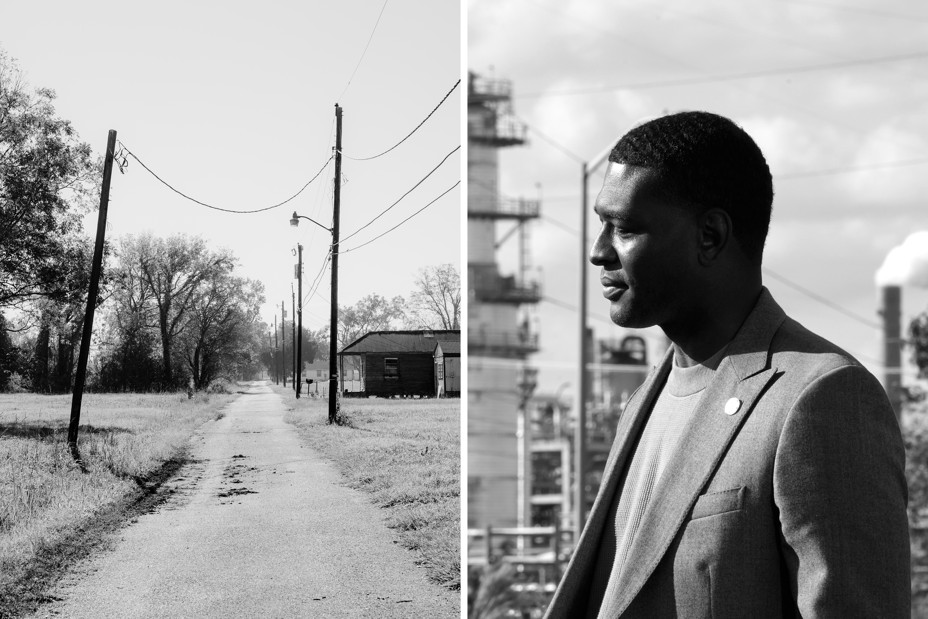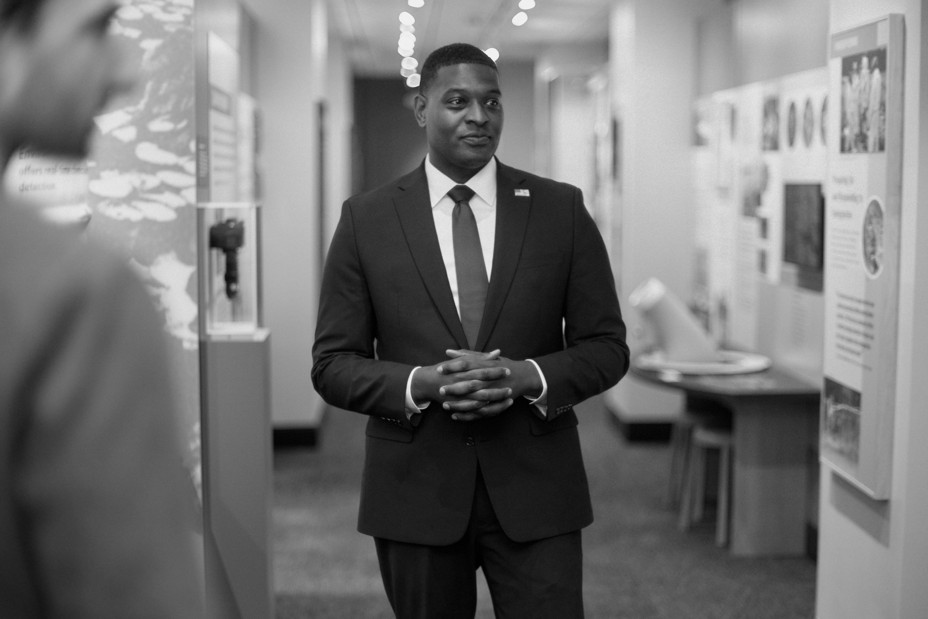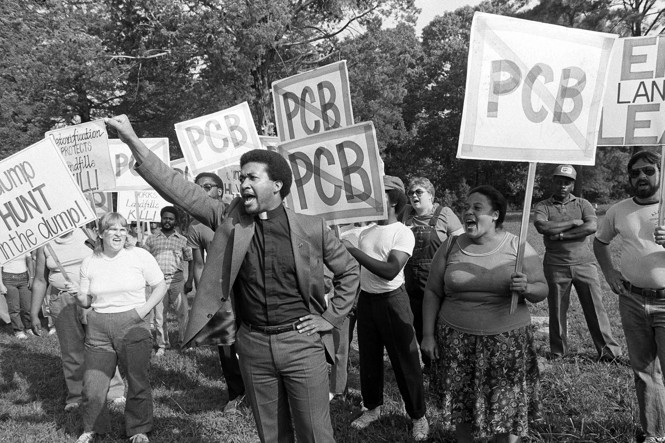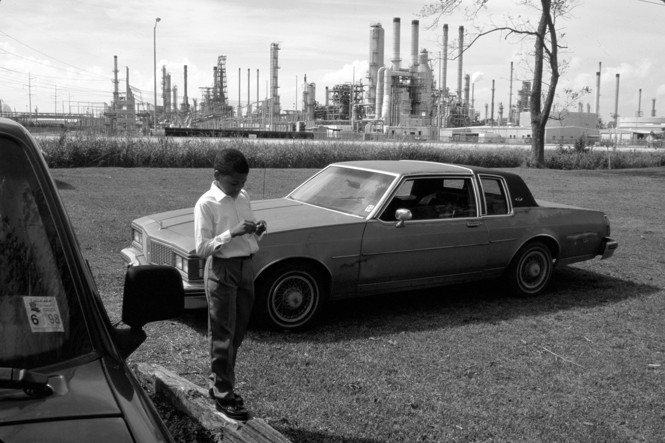Has Michael Regan’s EPA Kept Its Promises?
Photographs by Donavon Smallwood for The Atlantic
On a warm November afternoon in 2021, I drove out from New Orleans, following the Mississippi River north to the town of Reserve, in Louisiana’s St. John the Baptist Parish. As I approached the green mound of the river’s levees, a shadow fell over my windshield. The towering silhouettes of massive chemical plants and refineries dominated the horizon. Nestled among them were clusters of schools, stores, and houses. It was a fitting welcome to the region known to many as “Cancer Alley”—the 85-mile stretch along the river between New Orleans and Baton Rouge.
Michael Regan, at the time still new in his job as the Environmental Protection Agency’s administrator, stood in a field beside a small wooden house. Behind him, a Marathon refinery complex belched bright-orange gas flares. The house belonged to a 65-year-old man named Michael Coleman, who had detailed to Regan a list of health problems that he said had come from living in the shadow of the refinery. Regan worked the crowd in attendance, a group of residents and activists, and did the usual politician things: remembering and repeating names, flashing a brilliant smile, performing those two-handed-clasp handshakes that signal extra authenticity.
But certain other things that needed no signaling endeared Regan to the crowd. First was the fact that he was there at all. Second was, bluntly, the fact that, like most of the people he was meeting, Regan is Black. The crowd listened intently as the administrator spoke. “I’m able to put faces and names with this term that we call ‘environmental justice,’” Regan said. He promised the crowd that he would use the power of his office to make sure that those who needed resources the most got them.
As Regan observed, the people there were reminders of a brutal reality: Black, Indigenous, Latino, and low-income communities are far more likely to experience environmental problems—contamination, dumping, flooding, burning—than people in high-income, majority-white areas. To give one example: Black people suffer 54 percent more pollution from industrial facilities than do other Americans, which contributes to child-asthma rates that are about twice as high as those of white children. Black people are also 75 percent more likely than other Americans to live close to industrial facilities that generate hazardous waste. The movement to combat such inequalities is known as environmental justice.
Many of those gathered for Regan’s visit were veterans of that movement, and had been part of local campaigns to curb air and water pollution. In the face of hostility from the oil, gas, and chemical companies that dominate the area, and of disregard from all levels of government, they had commissioned independent studies showing extraordinary rates of exposure to carcinogens among Black residents, along with cancer rates 44 percent higher than the national average. After decades of silence, a visit from the administrator was a breakthrough.
 Left: A road between the Marathon Petroleum Refinery and the Cargyll Grain Mill in Reserve, Louisiana. Right: Michael Regan stands near the Marathon refinery in Reserve. (Bryan Tarnowski; Gerald Herbert / AP)
Left: A road between the Marathon Petroleum Refinery and the Cargyll Grain Mill in Reserve, Louisiana. Right: Michael Regan stands near the Marathon refinery in Reserve. (Bryan Tarnowski; Gerald Herbert / AP)
I joined Regan in the back of a black SUV on the way to his next destination, in nearby St. James Parish. We took the bridge across the Mississippi, overlooking the historic Whitney Plantation, then followed the curve of the levee west. “You know,” he said, “it’s not lost on me that these people look like me and I look like them.” I asked him what the folks in Reserve had told him privately after his public remarks. “They said that this visit felt different than the visits before, but there were no visions of grandeur,” he responded. His predecessors had failed to deliver on promises, and people here remembered that.
As we sped along, I envisioned how the area must have looked generations ago, with a sprawl of plantations where the ancestors of many of Cancer Alley’s residents were forced to toil. I thought about how those plantations had been reborn as sharecropping hubs and then, ultimately, after Louisiana struck oil, repackaged into the massive complexes one sees today. I wondered how Regan’s focus might be tested when faced with the weight of all that history, a history that is inseparably linked to the environmental picture today.
Regan was and is guarded and disciplined, and has learned the political art of cliché, as I discovered during a series of conversations with him over the past three years. When asked about the challenges of delivering on environmental-justice promises, he often asserted that environmental justice is “in the DNA” of the EPA, a contention that seems more aspirational than realized. When we talked about the relationship between the history of white supremacy in America and the reality of environmental injustice today, Regan consistently defaulted to the need to be “laser focused” on the present. In our conversations, Regan made clear that he didn’t intend to spend much time talking about the past.
In the three years since that November visit, Regan has rebuilt an EPA that was gutted by Donald Trump and has presided over an era of unprecedented climate-policy gains. The EPA has enforced a stronger Clean Air Act, advanced new rules to limit pollution from power plants and vehicles, enacted a landmark rule to eliminate “forever chemicals” in drinking water, and doled out billions of dollars to projects that transform local energy grids and reduce greenhouse gasses. Partly as a result of the EPA’s new rules, the U.S. reduced its emissions in 2023 and looks poised to continue that trend.
At the same time, the EPA has faced a string of adverse rulings in federal courts that could seriously limit its effectiveness. And its record on environmental justice is more uneven than many of those who attended that meeting in Reserve back in 2021 might have hoped for.
Regan regularly touts environmental-justice victories as central to the EPA’s mission. But following attacks from Republicans seeking to disempower the agency, he has made some awkward tactical retreats. He may wish to keep a laser focus on the here and now, but his agenda—and his very presence, perhaps, as a Black man wielding broad authority—has stirred up the ghosts of the past. He has learned the hard way why environmental justice has always been a struggle against long odds.
On the day he was confirmed to lead the EPA, in March 2021, Michael Regan stared down an enormous task. Over the previous four years, the agency had been the main casualty of Trump’s assault against the federal bureaucracy in the name of “draining the swamp.” Trump’s first pick to lead the EPA, the climate-denier Scott Pruitt, sought to scale back much of its core work and repeatedly proposed a dramatic reduction of the budget. More than 1,500 employees left the agency in the first 18 months of the Trump administration, reducing the workforce to levels not seen since Ronald Reagan’s presidency. By the time Regan got there, staffing and morale both were depleted.
President Joe Biden entrusted Regan with a climate agenda that would require the EPA to be more aggressive, nimble, and creative than it had ever been. But the White House couldn’t immediately secure additional funds to expand the EPA’s ranks of experts. So, in the first year and a half under Regan, the agency’s staff worked long hours and late shifts to try to handle a brief that had expanded dramatically.
On the heels of the murder of George Floyd and the purported “racial reckoning” of 2020, the Biden administration also made racial justice one of its key priorities throughout the government. As only the second Black person to lead the EPA, Regan became a natural face for this effort. He had worked in the agency before, during the Clinton and Bush administrations, and was well known in environmental-justice circles for his time leading North Carolina’s Department of Environmental Quality.
The EPA, however, had never enjoyed a great reputation for environmental justice. In the years since its inception, the agency had in many cases sided with industry on decisions to locate plants and hazardous-waste facilities near minority neighborhoods. Across all of its different roles—coordinating cleanups, distributing funds, advancing laws to limit air and water pollution—the agency has been accused of excluding or actively hurting minority communities.
Moreover, in its capacity as a civil-rights watchdog, the EPA had been a clear failure. Under Title VI of the Civil Rights Act of 1964, the EPA is explicitly authorized to take action against the unfavorable treatment of racial minorities by entities that it regulates and funds. A 2015 analysis by the Center for Public Integrity found that the EPA had rejected a number of civil-rights petitions from communities on the grounds that they had missed a 20-day statutory deadline—but the EPA itself appeared to have held up those petitions for an average of 254 days. The same report revealed that the EPA’s Office of Civil Rights had not made a single formal finding of discrimination—ever. Theoretically, any such finding would have given the EPA the power to compel polluters to clean up and to negotiate with affected communities, along with the power to penalize companies that failed to cooperate, but that authority was never defined or tested, because it was never used.
 Michael Regan talks to residents of the Fifth Ward during a tour in Houston on November 19, 2021. (Elizabeth Conley / Houston Chronicle / Getty)
Michael Regan talks to residents of the Fifth Ward during a tour in Houston on November 19, 2021. (Elizabeth Conley / Houston Chronicle / Getty)
Regan’s first big move upon taking office to address the EPA’s previous failures was a listening tour, which the EPA called its “Journey to Justice.” In addition to Cancer Alley, stops included Black neighborhoods in Jackson, Mississippi; Houston; and New Orleans. Regan also visited Puerto Rico, North Carolina, and Appalachia.
I traveled with the administrator on several of these trips, and his personal presence seemed to me as important as any policy that he might put forward. He inspected a cistern in a rural mountain town in Puerto Rico and listened as Jackson residents told him about having to boil their water to make it potable. At every stop that I attended on Regan’s tour, residents told me the visit itself had changed their outlooks. “That was a once-in-a-lifetime” thing, Sharon Lavigne, the president of Rise St. James, an environmental-justice organization, said after Regan’s visit to Cancer Alley. For her, the fact that the EPA went to people who had been overlooked and forgotten represented a major reversal.
At Texas Southern University, in Houston, Regan was greeted by Robert Bullard, a professor of urban planning and environmental policy, widely known as the “father of environmental justice.” Bullard had pushed for many of the environmental-justice powers that the federal government now holds, and helped create some. Over the previous three decades, Bullard had often criticized the EPA for what he believed was the agency’s abdication of its duty to protect communities of color. Yet, he embraced Regan, and praised him lavishly. To me, it seemed like the passing of the torch from the father of a movement to the man who hoped he’d be the son.
 Michael Regan at the EPA headquarters in Washington, D.C. (Donavon Smallwood for The Atlantic)
Michael Regan at the EPA headquarters in Washington, D.C. (Donavon Smallwood for The Atlantic)
Michael Regan was born in Goldsboro, North Carolina, in 1976. At the time, Robert Bullard was a young sociologist in the early stages of studying the very communities where Regan’s family fished and farmed. Regan’s mother worked as a nurse, and his father served with the National Guard in Vietnam before working as a USDA agricultural-extension agent. Previous generations had been farmers, and Michael Regan was keenly aware of the drive among Black families to own and work the land.
The flip side of this tie to the land has always been a profound vulnerability. Goldsboro is a mostly Black town in a belt of Black towns, all emerging from plantation slavery, in North Carolina’s inner coastal plain. Since emancipation, the area has been known for its tradition of freeholding Black farmers and independent Black communities. It is also known, not coincidentally, for its pollution, floods, and environmental devastation. (Like Regan, I am from a farming family in eastern North Carolina; both of our hometowns were submerged by Hurricane Floyd in 1999.)
When Regan was a toddler, with the civil-rights revolution of the 1960s not far in the rearview mirror, this landscape of inequity became the setting for a different kind of movement. In 1978, the government of North Carolina scrambled to find a way to clean up thousands of tons of soil that had been contaminated with polychlorinated biphenyls, chemicals classified by the EPA as probable carcinogens, after truckers had illegally dumped oil containing the chemicals on state roads rather than disposing of it properly. With the approval and assistance of the EPA, which had then been in existence for only eight years, the state chose to dump the contaminated soil in a landfill in Afton, a mostly Black hamlet in rural Warren County, about 80 miles north of Goldsboro. Officials had decided to clean up the land—by saddling a Black community with the pollution.
The decision sparked one of the most consequential and well-organized Black protests since the heyday of the civil-rights struggle. In 1982, after years of legal challenges and complaints, Black and white Warren County residents and sympathetic protesters lay down in the road to try to bar construction vehicles from the landfill site. Hundreds of people were arrested. The residents lost that battle—the landfill was built and trucks duly tipped the toxic dirt into it—but the national attention the campaign garnered helped recast it not as a local one-off but as the face of a larger problem. After being arrested for participating in the 1982 protest, the activist and publisher Ben Chavis coined the term environmental racism to describe the actions by the state and the EPA. Bullard would later define environmental justice as environmental racism’s opposing force. For its actions in Warren County, the EPA itself became the first villain of the environmental-justice era.
Regan was steeped in this history. He also understood the deep tensions between organizations like the EPA and communities like Afton, especially during a time when, as Bullard recalled when we spoke, justice was “a novel idea” within the agency. Regan believes that decisions such as the one involving the Afton landfill were made not out of malice but out of ignorance and neglect. “They definitely were not well acquainted with the communities,” he explained, referring to EPA officials. “So it was almost as if Warren County and those community members didn’t matter.”
It was fitting, then, that Regan would return to Warren County in September 2022 to announce the formation of the new Office of Environmental Justice and External Civil Rights, which would enjoy the highest possible status in the EPA. Flanked by Chavis and by the Reverend William Barber II, a civil-rights champion who, like Regan, is from eastern North Carolina, Regan pledged that everything he and the EPA did from then on “will be rooted in the realities and the demands and the aspirations of communities like Warren County, North Carolina; Mossville, Louisiana; Jackson, Mississippi; and so many others whose future hasn’t always felt certain.”
 Reverend Ben Chavis raises his fist as fellow protesters are taken to jail at the Warren County PCB landfill near Afton, North Carolina, on Thursday, September 16, 1982. (Greg Gibson / AP)
Reverend Ben Chavis raises his fist as fellow protesters are taken to jail at the Warren County PCB landfill near Afton, North Carolina, on Thursday, September 16, 1982. (Greg Gibson / AP)
The EPA’s environmental-justice agenda is broad. Much of it is powered by the agency’s ability to spend money. As part of the Justice40 Initiative, rolled out by the White House in the early days of Biden’s presidency, the EPA was directed to ensure that 40 percent of the benefits of its broadened climate powers assisted marginalized communities; as part of this commitment, the agency has announced billions in grants from the Inflation Reduction Act to address climate change in places affected by environmental injustice. The EPA also allocated billions of dollars from the 2021 infrastructure bill for lead-pipe removal and pollution cleanup in disadvantaged communities. In his role as the head of the agency, Regan has had immense influence.
But Regan wanted to do more than direct the distribution of new funding: The EPA also began to use civil-rights powers that it had previously neglected, enabling direct remediation of environmental injustices—not always at federal-government expense—and also calling out discrimination by name. In April 2022, the agency launched a civil-rights investigation of the Louisiana Department of Environmental Quality. The investigation was aimed at the Denka Performance Elastomer facility (Denka has denied wrongdoing) and another proposed plastics plant in St. James Parish, as well as at the general permitting practices of state and local bodies up and down Cancer Alley. In September of that year, the Office of Environmental Justice and External Civil Rights sent a letter to Louisiana officials to report its preliminary findings. The office asserted that “based on the data EPA has reviewed thus far, Black residents of the Industrial Corridor Parishes continue to bear disproportionate elevated risks of developing cancer from exposure to current levels of toxic air pollution.” In October, the EPA also opened an investigation in Jackson, Mississippi, based on a civil-rights complaint from the NAACP, which alleged that the state had withheld funds for fixing the majority-Black city’s failing water infrastructure, and had done so for reasons based on race.
These moves faced a significant obstacle: Without clear proof of racist intent, discrimination can be hard to establish. When it comes to environmental laws, permitting decisions, and industrial siting, unfavorable treatment rarely comes with outright declarations of bigotry. More typically, minority communities become de facto targets because they lack the political capital and other resources to challenge industrial polluters. Additionally, many communities inherit zoning laws, land-use ordinances, and hazardous sites that originated decades ago under more explicitly racist rationales—essentially making them victims of environmental redlining. Time is a great launderer.
A company may claim that a siting decision, say, was based simply on the availability of cheap land and had nothing to do with discrimination. But discrimination may explain why the land was cheap in the first place. In the 1950s, when big petrochemical companies came to Louisiana’s river parishes, they invariably built near Black communities, where most residents were disenfranchised. Those communities then became the anchors for an entire corridor—a “sacrifice zone,” as such locales are known.
A legal approach known as “disparate-impact theory” attempts to acknowledge this reality. Instead of solely trying to establish purposeful bigotry, it looks plainly at the racial effects of specific policy decisions. This theory has proved to be a powerful corrective when it comes to enforcing civil-rights law, particularly in voting-rights cases, and in policing, where so-called color-blind policies have clearly and consistently hurt Black citizens. After a police officer killed Michael Brown in Ferguson, Missouri, in 2014, for example, the Justice Department found that Black residents of Ferguson were disproportionately likely to be stopped by police; under a consent decree, the police have overhauled their policies and procedures.
But disparate-impact theory is controversial. It is detested by many conservatives, who generally view its use as a way to divine racism where there is none, and who often counter that forcing companies and states to proactively take race into account in their decision making is itself racism. Those detractors have hoped for decades to use the courts to invalidate the disparate-impact approach.
 Oil- and chemical-refinery plants sit beside Black communities along the Mississippi River south of Baton Rouge, in October 1998. (Andrew Lichtenstein / Corbis / Getty)
Oil- and chemical-refinery plants sit beside Black communities along the Mississippi River south of Baton Rouge, in October 1998. (Andrew Lichtenstein / Corbis / Getty)
 Michael Regan prays alongside marchers on March 6, 2022, during an anniversary commemoration of “Bloody Sunday” in Selma, Alabama. The Edmund Pettus Bridge was the site of police beatings of civil-rights activists during the first march for voting rights, on March 7, 1965. (Brandon Bell / Getty)
Michael Regan prays alongside marchers on March 6, 2022, during an anniversary commemoration of “Bloody Sunday” in Selma, Alabama. The Edmund Pettus Bridge was the site of police beatings of civil-rights activists during the first march for voting rights, on March 7, 1965. (Brandon Bell / Getty)
Amid a wider backlash against racial-justice efforts in America, the civil-rights investigations launched by Regan and the EPA in the Deep South made them targets. Among Republicans, the investigations helped earn the agency a reputation for being “woke.” And, undoubtedly, it was easier to pin that reputation on a Black man, no matter how meticulous he was about focusing on the present, not the past.
In response to the EPA’s preliminary finding of a disparate racial impact of pollution in Cancer Alley, Louisiana’s then–attorney general, Jeff Landry, filed a lawsuit in 2023 alleging that the agency had overstepped its civil-rights authority and had also become too closely allied with environmental-advocacy groups. Landry, now the governor and the leader of a conservative movement reshaping the state in every sphere, said in the filing that EPA officials had decided to “moonlight” like “social justice warriors fixated on race.” (Landry’s office did not respond to requests for an interview or for comment.)
As Republican attacks and threats of vigorous litigation proliferated, the agency began to pull back on its civil-rights investigations. In June 2023, just over a year after it began the Cancer Alley proceedings, the EPA dropped the investigation, citing a procedural issue. “I feel like we were put on the back burner,” Sharon Lavigne told The Washington Post. A few weeks later, the EPA resolved a civil-rights inquiry in Flint, Michigan, with no substantive changes to the state’s environmental-permitting process.
The civil-rights cases had been risky. An adverse ruling in any lawsuit could jeopardize the future of the disparate-impact theory—not just for one agency but for the whole government. That this could happen is a legitimate concern for the EPA, which has little by way of precedent or expertise to work with when it comes to applying disparate-impact theory in environmental law. But for citizens of communities like those in Cancer Alley, who waited years while being stonewalled and redirected, and who felt ignored even during the administration of the nation’s first Black president, Barack Obama, the agency’s retreat was perceived more as a lack of will than an abundance of caution.
Meanwhile, the backlash against the EPA’s use of its civil-rights authority continued. In January, Judge James Cain of the U.S. District Court for the Western District of Louisiana, a Trump appointee, issued a preliminary ruling in favor of Landry, temporarily enjoining the use of disparate impact in the EPA investigations in Louisiana. He wrote in his opinion that “pollution does not discriminate.” In April, after Regan traveled to Louisiana to announce stricter controls under the Clean Air Act on industrial emissions of ethylene oxide (a known carcinogen) and chloroprene (a likely carcinogen), Louisiana Congressman Clay Higgins said on X that “this EPA criminal should be arrested the next time he sets foot in Louisiana” and should be sent to the notorious Angola prison—a former slave plantation where a mostly Black inmate population is still forced to pick cotton.
A week later, a group of 23 Republican state attorneys general sent a letter to the EPA demanding that it end all civil-rights investigations based on disparate impact. The letter said that the concept of environmental justice “asks the States to engage in racial engineering” and argued that disparate-impact theory was forcing states to violate the equal-protection clause of the Fourteenth Amendment. The petition was skeptical of the idea of considering race at all in assessing the effects of pollution. “Indeed, the mere act of classifying individuals by their race,” the attorneys general wrote, picking up a formulation from Sandra Day O’Connor, “may stigmatize those groups singled out for different treatment.” In other words, according to the petitioners, it was Regan who was being racist.
Three weeks after the letter from the attorneys general, the EPA dropped its investigation into Mississippi’s handling of the water crisis in Jackson, citing insufficient evidence. Louisiana, meanwhile, pressed ahead in federal court. In late August, Judge Cain made his injunction against the EPA in Louisiana permanent. But the legal challenges might not stop there. In his ruling, Cain also opened the door for broader, national challenges to all federal civil-rights enforcement based on disparate impact.
Meanwhile, activists are pushing the EPA, strenuously, to resist the backlash against disparate impact, hoping that the agency won’t give up any more ground. This September, a group of about 50 individuals—lawyers, academics, and directors of environmental-justice organizations—sent the EPA a letter countering the petition from Republican attorneys general and urging the agency to “to take the time needed to fully analyze Title VI and its history and purpose.” The letter specifically criticized the EPA’s actions in Cancer Alley, asserting that the agency “caved” as a result of the Louisiana lawsuit. Among the signatories was Robert Taylor, a resident of St. John Parish, who had joined Regan during his first visit to the town of Reserve.
In late June, I attended an address Regan gave to hundreds of his staff, gathered together under the gilded ceiling of the Andrew W. Mellon Auditorium, next door to the EPA’s offices. Heralded by Luther Vandross’s “Never Too Much” and again accompanied by the civil-rights activist Ben Chavis, Regan walked to the podium. He gave a rousing address celebrating the agency’s achievements on climate and environmental justice, and lobbed more than a few shots at Biden’s predecessor, whom he did not name. The auditorium was packed—a reminder of Regan’s success in attracting professionals back to the agency.
The next day, I met Regan in his office at the EPA’s headquarters in Washington. Just a few minutes earlier, as I was heading to the interview, the Supreme Court had issued its pivotal decision in Loper Bright Enterprises v. Raimondo, overturning Chevron v. NRDC, a 40-year-old ruling that had given the EPA broad discretion to interpret environmental law. In another ruling the previous day, the Court had paused the EPA’s ability to enforce a rule regarding pollution that crossed state lines. Regan’s vision for the EPA had never been more imperiled.
“We’re kind of digesting and taking a look at what was written by the judges,” Regan told me as we settled into armchairs. “It’s worrisome that there are certain interests in this country that are trying to take power away from the very folks that need protection from environmental injustices.” We sat by an unlit fireplace in a room that he’d clearly grown into. A couch was adorned with a blanket from his alma mater, North Carolina A&T. The office displayed artwork from his 10-year-old son, Matthew. Regan told me about his frequent trips back to our home state, where his parents always demand more time with their grandson, and where he goes fishing to clear his mind.
I asked Regan about the notoriety he’d achieved in the eyes of the Republicans. “Quite frankly, it just seems to me that anything we do, no matter what it is, is going to be criticized,” Regan said. “And so with that in mind, it only makes me more emboldened, more strident, but also cautious in terms of the actions that we take.” To Regan, boldness and caution are not at odds with each other. I, however, was not so sure.
Regardless, caution of a sort is understandably top of mind at the EPA today, and it was on my mind too. I wanted to know how, in the latter half of this year, Regan might future-proof the EPA against the possibility that Trump returns to office. “The previous administration was something that no one had ever seen before,” he said. “There was a shock that happened to this place that I think shook it to its core.” I suddenly understood that the previous day’s event had been intended as a pep rally, hoping to persuade career employees to stay committed in uncertain times, especially after losses in federal courts. That effort—to manage morale, to bet on the bureaucracy—is itself perhaps the best available form of future-proofing, if still imperfect. A large team of seasoned professionals in the middle ranks of a government agency, committed to a mission, is a significant force.
Regan never bit on my questions about doomsday scenarios under a possible Trump presidency. He wanted to talk about the EPA’s wins instead. Regan and the agency may have had to abandon some of their broader civil-rights investigations, but they had other levers to pull—the investment of many billions, for one, and a variety of enforcement actions. The EPA is overseeing the federal takeover of the water infrastructure in Jackson while also providing a $600 million grant for an overhaul of the system. The same Clean Air measures that earned Regan the threat of arrest in Louisiana will in all likelihood dramatically reduce pollution by the Denka plant in Cancer Alley—although the state recently secured a two-year deadline for the plant to comply, superseding the EPA’s original 90-day compliance window.
 Regan meets with senior officials at the EPA headquarters. (Donavon Smallwood for The Atlantic)
Regan meets with senior officials at the EPA headquarters. (Donavon Smallwood for The Atlantic)
Many activists had visions of the EPA playing a role akin to the Department of Justice in the 1960s, actively naming racism and rooting it out. Those visions have not been realized. I asked Regan why the agency had dropped the investigations that had been the signature of its environmental-justice efforts—why caution had trumped boldness in those cases—and he all but confirmed my suspicion: The EPA feared that pushing too hard could backfire. As Regan saw it, any vulnerabilities in the cases could undercut the disparate-impact approach altogether—perhaps destroying much of the Civil Rights Act in the process. The threat, he said, was especially acute given the inclinations of a conservative Fifth Circuit Court of Appeals, in New Orleans, and activists such as Landry, who want “to use the court system to take away these tools.” We returned more directly to one of the major lessons Regan has absorbed during his time in office: the necessity of caution. Regan has encountered the quintessential paradox that all Black politicians in America face: Aggressively working to protect the communities that sent them into government in the first place is usually the quickest way to find oneself out of government. Those who remain typically find success in bending the system rather than attempting to break it.
If the bending saves even one Black community from lead poisoning or one Puerto Rican neighborhood from carcinogens, isn’t that worth it? This is, in many ways, the age-old debate of politics on the margins in America: whether the country can achieve freedom and equality incrementally through institutions or whether those institutions have poison at the root and must be fundamentally remade. The EPA, in pursuing environmental justice, strains against its own history and against some legal interpretations of its powers. But a more forthrightly activist agency would certainly find itself undone.
As a native of eastern North Carolina myself, I began covering environmental justice because I wanted more people to hear about and understand communities like my own—communities like Jackson and Cancer Alley and the Lower Ninth Ward of New Orleans. Regan’s time in the EPA has been a success on that same front: awareness. His visits to polluted communities alone were radical reinventions of the agency’s relationship with justice, and have elevated it in the national consciousness.
At the same time, in terms of civil-rights adjudication itself, the EPA will likely finish Biden’s term with a record little better than the ones under his predecessors. And it hangs its hopes on a set of enforcement actions that might be reversed under a Trump administration. As Regan prepares the agency’s rearguard contingencies, one opportunity—the chance for the EPA to put the government’s imprimatur on a statement that places like Cancer Alley have been made to suffer because of racism—slips away.
Regan and I have gone back and forth about this: about the costs and benefits of naming things, about exactly how America’s past should be accounted for in its present governance. “It’s scary for some to think that environmental justice has focused in on past transgressions and how we got there,” Regan said. He is right: It is, for some, indeed scary.


